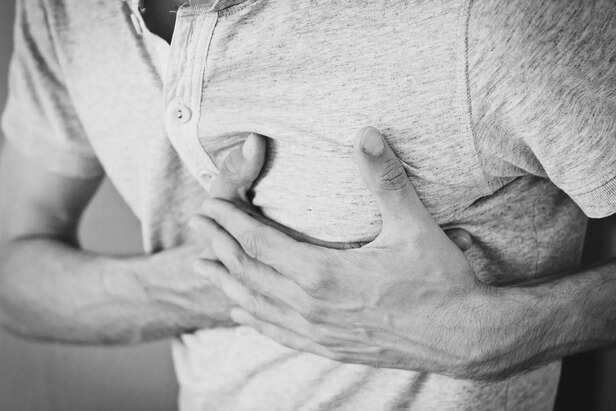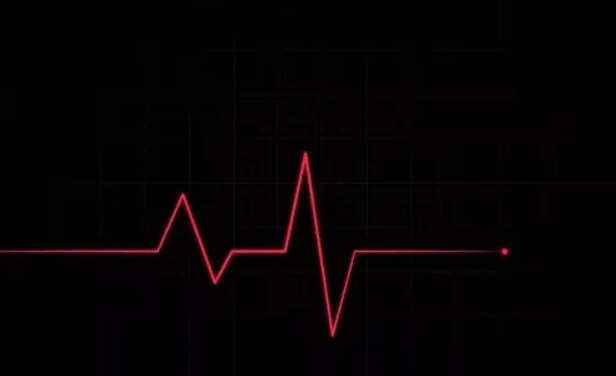What Your Body Does 30 Days Before a Heart Attack (And How to Stop It)
Nidhi | Jul 03, 2025, 23:28 IST
( Image credit : Freepik, Timeslife )
Most people think heart attacks happen without warning, but your body often tries to alert you weeks in advance. Subtle signs like unusual fatigue, shortness of breath, chest discomfort, or even indigestion could be early warnings of a heart attack. This article explains the 7 key signs to watch for, why they happen, and practical steps you can take now to stop a minor issue from turning into a life-threatening event. Listen when your body whispers — it could save your heart and your life.
Most people believe a heart attack strikes without warning — one minute you’re fine, the next you’re fighting for your life. But what many don’t realise is that in most cases, your body sends you signals days, even weeks, in advance. The real danger? These signs are so subtle and common that people mistake them for routine aches, stress, or indigestion — until it’s too late.
Heart disease remains one of the leading causes of sudden death globally. But the good news is, 80% of premature heart attacks are preventable if you catch the warning signs early and act on them. Imagine if you could recognise these hidden clues a month before, get simple tests like an ECG or an echo done, and make small lifestyle changes that could save your life.
Recognising these 7 signals early and taking action could literally save your life.
Why it happens: When your arteries start to narrow due to plaque buildup, blood flow to your heart muscles is reduced. This causes a feeling of tightness, heaviness, or burning in the chest — known as angina.
How it feels: The discomfort may come and go, and is often triggered by physical activity, stress, or heavy meals. Many people confuse it with acidity, gas, or muscle strain.
What to watch for: If the pain spreads to the left shoulder, arm, jaw, neck, or back — or if it lasts longer than a few minutes and improves with rest — it could be a red flag.
How to stop it: See your doctor for an ECG, stress test, or coronary angiography. Medications, stents, or lifestyle changes can help improve blood flow and prevent a blockage.
Why it happens: If your heart muscle isn’t pumping efficiently due to blockages or weakened heart function, fluid can build up in your lungs, making it harder to breathe.
How it feels: You may feel breathless while doing things you used to manage easily — climbing stairs, walking short distances, or even lying flat at night.
What to watch for: If you suddenly need extra pillows to sleep, wake up gasping for air, or feel winded at rest, your heart could be struggling.
How to stop it: Don’t ignore this as “getting older” or “being unfit”. Get an echocardiogram to check your heart’s pumping capacity. Medication or procedures can improve heart function.

Why it happens: If your heart can’t pump enough blood to meet your body’s needs, you feel tired and drained even doing simple activities.
How it feels: Constant exhaustion, heavy limbs, or feeling wiped out after routine tasks like grocery shopping or walking the dog.
What to watch for: Sudden or severe fatigue is a common early sign, especially in women, and can show up days or weeks before a heart attack.
How to stop it: Listen to your body — unusual tiredness isn’t “just stress”. Get a full cardiac check-up, especially if combined with other symptoms.
Why it happens: When your arteries are blocked, your heart works harder to pump blood, activating your nervous system and causing you to sweat more to cool down.
How it feels: Cold, clammy sweat that shows up when you’re resting or sleeping, not just when you’re exercising.
What to watch for: If you suddenly break out in a cold sweat, feel lightheaded, or experience chest discomfort with it, it could be a sign your heart is struggling.
How to stop it: Keep track of sweating episodes. If it happens repeatedly with other warning signs, see a doctor without delay.
Why it happens: A struggling heart can make it harder for your body to relax at night. Low oxygen levels or fluid buildup can wake you up or make you feel restless.
How it feels: Waking up gasping for air, trouble falling asleep, frequent awakenings, or vivid bad dreams. Some people describe a vague sense of dread.
What to watch for: If your sleep pattern changes for no clear reason and you feel exhausted despite “sleeping,” it’s time to check your heart.
How to stop it: Monitor your sleep quality. If you notice restlessness along with shortness of breath, get medical advice promptly.
Why it happens: Blocked arteries or damaged heart muscle can disrupt the heart’s electrical system, causing arrhythmias.
How it feels: A fluttering sensation, pounding heartbeat, or skipped beats, especially when you’re at rest.
What to watch for: If palpitations come with chest discomfort, dizziness, or fainting, they may signal a serious heart problem.
How to stop it: Don’t dismiss it as anxiety without checking. An ECG or Holter monitor can detect rhythm issues early so you can treat them.Why it happens: Poor blood flow can affect the nerves that help control digestion. Some people — especially women — feel upper stomach discomfort instead of chest pain.
How it feels: You may have nausea, bloating, indigestion, or a feeling of “fullness” even without eating a heavy meal.
What to watch for: If your stomach issues don’t go away with antacids or usual remedies, and come with fatigue or chest tightness, it could be your heart.
How to stop it: Keep an eye on persistent digestive symptoms. Combined with other signs, they deserve medical attention.Know your numbers: Monitor blood pressure, cholesterol, and sugar levels regularly.
Stay active: 30 minutes of moderate exercise most days of the week keeps your heart strong.
Eat smart: Limit salt, sugar, processed foods, and bad fats. Add more fruits, veggies, and whole grains.
Quit smoking & limit alcohol: Smoking doubles your risk of a heart attack.
Manage stress: Chronic stress can raise blood pressure and strain your heart. Your body rarely lets you down without warning. When something feels “off” — persistent chest discomfort, breathlessness, unusual tiredness, or cold sweats — it’s your heart’s way of asking for help. Catch the warning signs early, get tested, and follow your doctor’s advice. A timely ECG, simple lifestyle changes, or medications can make the difference between life and death.
Stay informed. Stay alert. Protect your heart.
Disclaimer: This article is for informational purposes only and should not be considered medical advice. Always consult a qualified healthcare professional for diagnosis and treatment. Never ignore professional advice or delay seeking it based on this information.
Heart disease remains one of the leading causes of sudden death globally. But the good news is, 80% of premature heart attacks are preventable if you catch the warning signs early and act on them. Imagine if you could recognise these hidden clues a month before, get simple tests like an ECG or an echo done, and make small lifestyle changes that could save your life.
Recognising these 7 signals early and taking action could literally save your life.
1. Recurring Chest Discomfort or Pressure

chest pain
( Image credit : Pexels )
Why it happens: When your arteries start to narrow due to plaque buildup, blood flow to your heart muscles is reduced. This causes a feeling of tightness, heaviness, or burning in the chest — known as angina.
How it feels: The discomfort may come and go, and is often triggered by physical activity, stress, or heavy meals. Many people confuse it with acidity, gas, or muscle strain.
What to watch for: If the pain spreads to the left shoulder, arm, jaw, neck, or back — or if it lasts longer than a few minutes and improves with rest — it could be a red flag.
How to stop it: See your doctor for an ECG, stress test, or coronary angiography. Medications, stents, or lifestyle changes can help improve blood flow and prevent a blockage.
2. Shortness of Breath

Shortness of Breath
( Image credit : Freepik )
Why it happens: If your heart muscle isn’t pumping efficiently due to blockages or weakened heart function, fluid can build up in your lungs, making it harder to breathe.
How it feels: You may feel breathless while doing things you used to manage easily — climbing stairs, walking short distances, or even lying flat at night.
What to watch for: If you suddenly need extra pillows to sleep, wake up gasping for air, or feel winded at rest, your heart could be struggling.
How to stop it: Don’t ignore this as “getting older” or “being unfit”. Get an echocardiogram to check your heart’s pumping capacity. Medication or procedures can improve heart function.
3. Unusual Fatigue and Weakness

Fatigue and Weakness
( Image credit : Freepik )
Why it happens: If your heart can’t pump enough blood to meet your body’s needs, you feel tired and drained even doing simple activities.
How it feels: Constant exhaustion, heavy limbs, or feeling wiped out after routine tasks like grocery shopping or walking the dog.
What to watch for: Sudden or severe fatigue is a common early sign, especially in women, and can show up days or weeks before a heart attack.
How to stop it: Listen to your body — unusual tiredness isn’t “just stress”. Get a full cardiac check-up, especially if combined with other symptoms.
4. Excessive Sweating — Especially Cold Sweats

Excessive Sweating
( Image credit : Freepik )
Why it happens: When your arteries are blocked, your heart works harder to pump blood, activating your nervous system and causing you to sweat more to cool down.
How it feels: Cold, clammy sweat that shows up when you’re resting or sleeping, not just when you’re exercising.
What to watch for: If you suddenly break out in a cold sweat, feel lightheaded, or experience chest discomfort with it, it could be a sign your heart is struggling.
How to stop it: Keep track of sweating episodes. If it happens repeatedly with other warning signs, see a doctor without delay.
5. Sleep Disturbance or Restlessness

Sleep Disturbance
( Image credit : Freepik )
Why it happens: A struggling heart can make it harder for your body to relax at night. Low oxygen levels or fluid buildup can wake you up or make you feel restless.
How it feels: Waking up gasping for air, trouble falling asleep, frequent awakenings, or vivid bad dreams. Some people describe a vague sense of dread.
What to watch for: If your sleep pattern changes for no clear reason and you feel exhausted despite “sleeping,” it’s time to check your heart.
How to stop it: Monitor your sleep quality. If you notice restlessness along with shortness of breath, get medical advice promptly.
6. Irregular Heartbeat or Palpitations

Irregular Heartbeat
( Image credit : Pexels )
Why it happens: Blocked arteries or damaged heart muscle can disrupt the heart’s electrical system, causing arrhythmias.
How it feels: A fluttering sensation, pounding heartbeat, or skipped beats, especially when you’re at rest.
What to watch for: If palpitations come with chest discomfort, dizziness, or fainting, they may signal a serious heart problem.
How to stop it: Don’t dismiss it as anxiety without checking. An ECG or Holter monitor can detect rhythm issues early so you can treat them.
7. Nausea, Indigestion, or Abdominal Discomfort
How it feels: You may have nausea, bloating, indigestion, or a feeling of “fullness” even without eating a heavy meal.
What to watch for: If your stomach issues don’t go away with antacids or usual remedies, and come with fatigue or chest tightness, it could be your heart.
How to stop it: Keep an eye on persistent digestive symptoms. Combined with other signs, they deserve medical attention.
How to Prevent a Heart Attack
Stay active: 30 minutes of moderate exercise most days of the week keeps your heart strong.
Eat smart: Limit salt, sugar, processed foods, and bad fats. Add more fruits, veggies, and whole grains.
Quit smoking & limit alcohol: Smoking doubles your risk of a heart attack.
Manage stress: Chronic stress can raise blood pressure and strain your heart.
Listen When Your Body Whispers
Stay informed. Stay alert. Protect your heart.
Disclaimer: This article is for informational purposes only and should not be considered medical advice. Always consult a qualified healthcare professional for diagnosis and treatment. Never ignore professional advice or delay seeking it based on this information.
